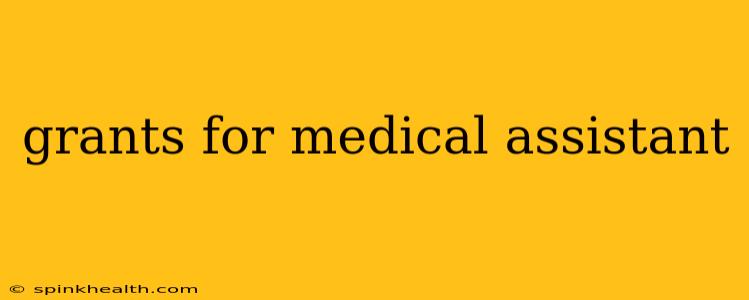The path to becoming a certified medical assistant (CMA) or registered medical assistant (RMA) can be both rewarding and challenging. The dedication, hard work, and specialized skills required often come with significant financial investment. But what if I told you there are avenues to help fund your education and training? This guide explores the exciting world of grants for medical assistants, opening doors to a fulfilling career in healthcare without the crushing weight of debt.
Imagine this: you’re finally holding that certification, ready to embark on a career making a real difference in people's lives. The path to get there, however, can be paved with tuition fees, exam costs, and the general expenses of attending school or training programs. This is where grants come in – they can be a lifeline, offering financial assistance without the need for repayment.
What Types of Grants Exist for Medical Assistants?
The search for grants might feel overwhelming at first, but breaking it down helps. Grants typically come from various sources, each with its specific eligibility criteria.
-
Government Grants: Federal and state governments often offer grants for healthcare-related education and training. These are highly competitive, requiring detailed applications and demonstrating a significant need. Think of them as prestigious awards recognizing exceptional potential.
-
Private Grants: Foundations, charities, and non-profit organizations dedicated to healthcare or education provide grants. These often focus on specific demographics or areas of need, such as students from underserved communities or those pursuing specialized medical assistant roles.
-
Hospital and Healthcare System Grants: Many hospitals and healthcare systems offer scholarships or grants to individuals pursuing careers within their organizations. This can be a great option if you have a particular hospital or clinic in mind where you want to work.
-
Professional Organizations: Associations like the American Association of Medical Assistants (AAMA) or similar organizations may offer scholarships and grants to their members or aspiring members. These are often tailored to support professional development within the field.
How to Find Grants for Medical Assistants?
Finding the right grant requires a bit of detective work, but it’s definitely worth the effort. Here's a step-by-step approach:
-
Start with Online Search Engines: Use keywords like "medical assistant grants," "scholarships for medical assistants," or "financial aid for medical assistant programs" to explore various grant opportunities.
-
Check Government Websites: Explore websites of federal and state agencies that oversee education and healthcare funding. Look for grant programs specifically targeted at healthcare professions.
-
Explore Foundation Databases: Websites like GrantWatch or Foundation Center (now Candid) offer comprehensive databases of grants from various foundations. Filter your searches to focus on healthcare and education.
-
Contact Your School's Financial Aid Office: Your educational institution's financial aid office is a treasure trove of information. They often have a list of external grants and scholarships relevant to their students.
-
Network with Healthcare Professionals: Connect with medical assistants, doctors, or other healthcare professionals. They may be aware of lesser-known grants or scholarships that could benefit you.
What are the Eligibility Requirements for Medical Assistant Grants?
Eligibility requirements vary significantly depending on the grant provider. Common requirements include:
-
Academic Performance: Many grants require a minimum GPA or academic standing.
-
Financial Need: Some grants prioritize applicants demonstrating financial hardship. You might need to provide proof of income or other financial documentation.
-
Enrollment in a Qualified Program: Grants often specify that you must be enrolled in or accepted into an accredited medical assistant program.
-
Specific Demographic Criteria: Some grants target specific groups, such as minorities, veterans, or individuals from disadvantaged backgrounds.
Are there Grants Specifically for Returning Adults or Non-Traditional Students?
Yes, many grants recognize the challenges faced by returning adults or non-traditional students entering or re-entering the healthcare field. These grants often focus on supporting individuals who have overcome obstacles to pursue their education. Look for grants that emphasize "adult learners," "career changers," or "non-traditional students" in their eligibility criteria.
What Documents Do I Need to Apply for a Medical Assistant Grant?
Be prepared to provide a comprehensive application package, which typically includes:
-
Completed Application Form: Follow all instructions carefully. Inaccurate or incomplete applications are often rejected.
-
Academic Transcripts: These show your academic history and performance.
-
Letters of Recommendation: Seek recommendations from professors, employers, or mentors who can speak to your character and potential.
-
Financial Documentation: This may include tax returns, proof of income, or other financial statements demonstrating your financial need.
-
Essay or Personal Statement: This is your opportunity to showcase your passion for healthcare, your career goals, and why you deserve the grant. Make it compelling!
The journey to becoming a medical assistant is a significant step, and securing a grant can make the difference between pursuing your dream and putting it on hold. With diligent research and a well-crafted application, you can unlock the financial support you need to launch a rewarding career in the healthcare field. Good luck!

